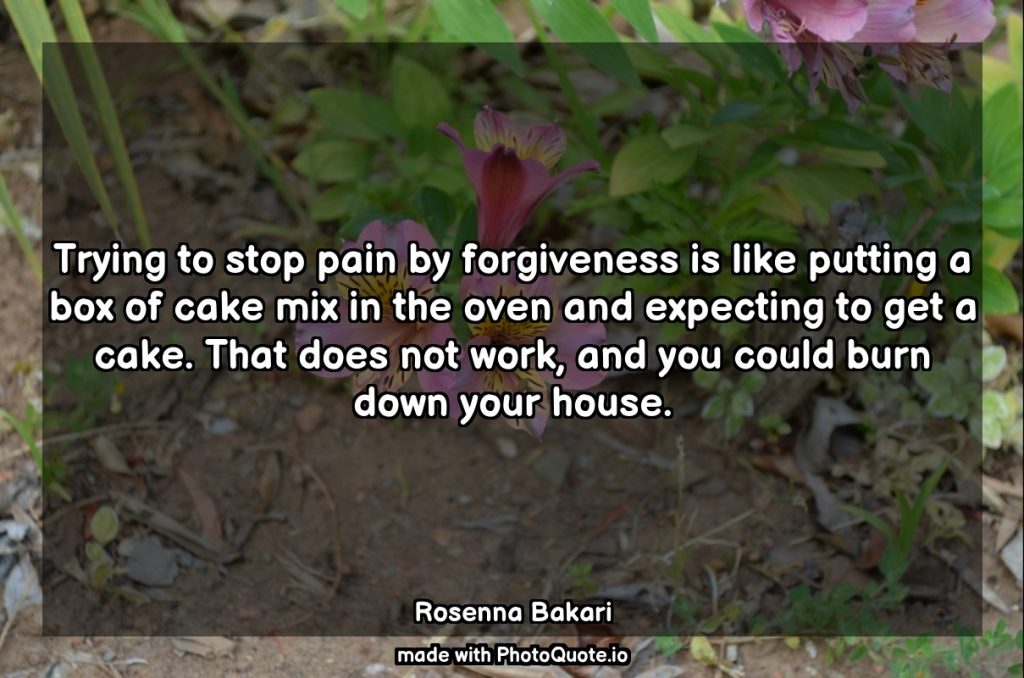Have you ever tried to tell someone about an abusive person in your past, and they said you should forgive them and move on? How did that make you feel? I get angry when people suggest things like that, as if I can just flip a switch and forgive them and suddenly that makes everything okay. It does not. There’s no off-switch for trauma. Wouldn’t it be nice if there was?
I’m going to go all analytical here about the concept of Forgiveness, starting with the dictionary definition of the word:
Definition of forgive, according to the Merriam-Webster dictionary:
transitive verb
- to cease to feel resentment against (an offender)
- to give up resentment of or claim to requital for
- to grant relief from payment of forgive a debt
Let’s unpack this a bit.
Most people who talk of forgiveness are probably talking about definition 1, giving up resentment. What is resentment?
According to Merriam-Webster, it is “a feeling of indignant displeasure or persistent ill will at something regarded as a wrong, insult, or injury”. So basically, feeling angry about something someone has done.
As I wrote previously here, anger tells you where your boundaries are. Without anger, it’s hard to know what behaviour of other people is acceptable and what isn’t. Abusers like to take advantage of this by making you feel ashamed of being angry at them. So to forgive in the sense of no longer being angry means to neglect your boundaries, which is absolutely a bad idea when dealing with abusive people. Some things are simply too fucked up to not be angry about. Anger is a healthy and useful emotion, especially in the context of abuse!
As for definition 2, what is requital? According to the Merriam-Webster dictionary, it is “something given in return, compensation, or retaliation”. So in the case of abuse, it’d be something like the abuser giving you something to make up for the abuse, or the abuser being punished for what they did in some way. Since there is literally nothing that can actually make up for abuse, this part of definition 2 doesn’t apply. As for the abuser being punished, they are not really happy people anyway. Making them even less happy isn’t going to make me feel any better or help me heal in any way. It also isn’t going to motivate them to change. So, despite that one weird dream I had of beating my parents to death with a shovel while screaming at them, I don’t feel like there is anything they could do or any way they could suffer that would make me feel better about what they did.
Definition 3 is interesting. Yes, this is meant in a financial context, but what if we applied it to other things as well? When the people in my life abused me, they created a debt. They took things from me (my self-esteem, my mental health, a happy childhood, etc), and so they owe me. But they cannot possibly ever give me those things back. They cannot recreate what they destroyed – they literally don’t have the ability to do so. So in this sense I can forgive them of that debt that they can’t possibly repay. And as stated above, they can’t make up for it by giving me other stuff or by suffering, either.
Also, part of this letting go of the debt thing is also letting go of the fantasy that someday they will realize how badly they fucked up, grow into better people, and actually be the parents I needed them to be when I was little. That’s not going to happen. A part of me wishes it would, and it’s hard to accept that it won’t, but I know they can’t be what I needed them to be.
So, back to the people who tell us to “forgive and forget”. What they’re saying is a form of invalidation. They’re really saying that they’re not comfortable with our anger and resentment against the people who hurt us, and they need us to let it go so that they can feel better.
Forgiveness can also be a form of spiritual bypassing, especially when it’s promoted by religions and spiritual teachers. Bypassing anger and jumping straight to forgiving someone – without actually grieving the losses caused by what they did – doesn’t really heal you in any way. It’s just another form of emotional repression, and can actually keep you stuck longer. This could also be what those “forgive and forget” people are suggesting, because they forgave someone in this bypassing way, and it made them feel “better” (they are repressing their anger). Maybe our anger reminds them of theirs, and so they invalidate ours because they don’t want their own anger to resurface.
So, I don’t really like the word Forgiveness. I prefer Acceptance. Acceptance of the things that happened, as well as my responsibility to working on healing myself. I also accept the fact that the people who hurt me are not capable of being any better. I accept them as they are, as well as the fact that I don’t want them in my life. I accept myself as I am, as well as the fact that some things are a lot harder for me than they would be for other people, and I accept that I need to be kind to myself. Forcing myself to forgive them prematurely would be unkind to myself, so I’m not going to do that.
Update: Here is a nice article written by a psychologist about how forgiveness can be harmful.
